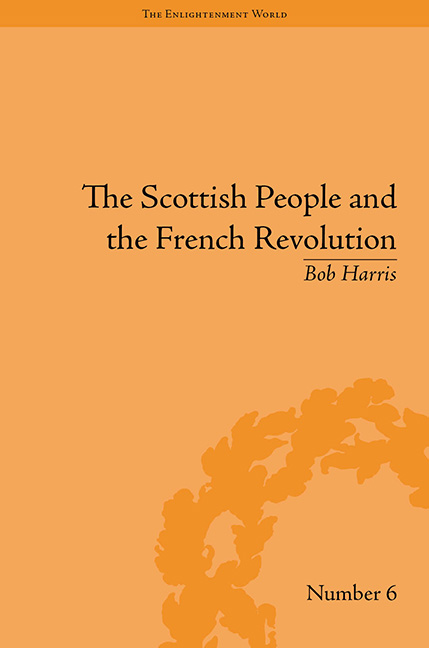Book contents
- Frontmatter
- CONTENTS
- Preface
- Introduction
- 1 The Eighteenth-Century Roots of Scottish ‘Jacobin’ Politics
- 2 Newspapers, the French Revolution and Public Opinion
- 3 ‘The True Spirit of Liberty’: Scottish Radicals, 1792–4
- 4 Checking the Radical Spirit
- 5 Volunteers, the Militia and the United Scotsmen, 1797–8
- 6 Bread, Dearth and Politics, 1795–1801
- Conclusion
- Notes
- Works Cited
- Index
Introduction
- Frontmatter
- CONTENTS
- Preface
- Introduction
- 1 The Eighteenth-Century Roots of Scottish ‘Jacobin’ Politics
- 2 Newspapers, the French Revolution and Public Opinion
- 3 ‘The True Spirit of Liberty’: Scottish Radicals, 1792–4
- 4 Checking the Radical Spirit
- 5 Volunteers, the Militia and the United Scotsmen, 1797–8
- 6 Bread, Dearth and Politics, 1795–1801
- Conclusion
- Notes
- Works Cited
- Index
Summary
Modern historians have portrayed the impact of the French Revolution on Scottish politics and society as limited, especially when compared to other parts of the British Isles. Scots, it is argued, were strongly loyal to the political and social status quo, and the populace largely quiescent in the face of the political excitements and strains of the 1790s. As Louis Cullen wrote in 1989, in words which fully reflect this orthodoxy: ‘The French Revolution … passed over Scotland not quite unnoticed but with little sign of a likelihood of upheaval’. Cullen was comparing Scotland to Ireland, a comparison which inevitably tends to emphasize what did not happen in the former. Nevertheless, the implication remains the same; that what needs explanation is the country's political stability in the 1790s and, in T. C. Smout's phrase, the ‘uninflammability’ of its population.
Scotland's relative stability in this period is undeniable, and it is a theme which will feature at various points in this book. Edinburgh was not London or Dublin, and Glasgow, or Dundee or Paisley, to take two of the country's fastest growing manufacturing towns of the later eighteenth century, were not, say, Sheffield, Norwich or Belfast, all sites of strong and tenacious radical political organizations and traditions. Compared to Ireland and some parts of England, radicalism as an open force was quickly suppressed, although this was due in no small part to a uniquely (in a British context) repressive legal system. Edinburgh became a stronghold of political reaction, which, given the strategic importance of the capital in political culture in this period, including radical politics, was another fact of major importance in explaining the course and outcome of the radicals’ campaign. An embattled opposition Whig element led by Henry Erskine, until 1796 the Dean of the Faculty of Advocates, did manage to retain a foothold in public life in the capital and, on occasion, such as in late 1795, mobilize a significant amount of opposition to policies of political repression and the conduct of the war; but their influence was episodic and limited.
- Type
- Chapter
- Information
- The Scottish People and the French Revolution , pp. 1 - 12Publisher: Pickering & ChattoFirst published in: 2014



